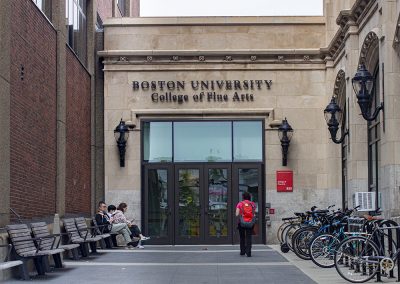
Olivia Tambascio, a senior in the College of Arts and Sciences, never expected to be minoring in theatre. Tambascio, majoring in biology on the pre-med track, started taking classes in the College of Fine Arts to fulfill general education requirements and pursue her passions in carpentry and theatre.
“I definitely did not think that was what I was going to do,” Tambascio said. “Originally, I was just going to take a few classes to fulfill HUB … but I really, really enjoyed the types of projects we were doing.”
Across CFA’s three schools — the School of Music, School of Theatre and School of Visual Arts — classes explore education, history and career development. Classes like Elements of Music Theory, Contemporary Dramatic Literature and Introduction to Art Education, among others, are offered to non-CFA majors. Students not in CFA can also take music lessons and participate in music ensembles.
SoT Assistant Professor Kristen Leahey said having some CFA classes open to non-CFA majors brings “different perspectives” and “skill sets” to the classroom.
“One of my aspirations or hopes [for] these classes is that it’s an opportunity for students in the College of Fine Arts to meet students from across the university,” Leahey said. “I’d love to see more of that.”
SVA Lecturer Jeffery Nowlin, who graduated from the CFA in 2010, said CFA classes were not at all open to students from other colleges when he attended BU.
“It really does help to make connections between different areas of study,” Nowlin said. “For me, one of the best things about Boston University is that there is so much interexchange of ideas.”
However, according to the list, many of the classes fill quickly, especially SVA’s drawing and printmaking courses.
Katarina Quach, a junior in the College of Communication, said she declared a visual arts minor in CFA last fall as a sophomore, but has yet to take a single class on the track. As a non-CFA major, Quach said, you can’t register for the classes yourself on Student Link.
“They basically have to … put you on a wait list until all of the CFA majors have registered,” Quach said. “And in most circumstances, that just means that you can’t take the class.”
Quach said she won’t be able to finish her minor before she graduates, but that hopefully she’ll be able to take a few visual arts classes as a senior.
“I just wish that they didn’t give you the option to sign up for the minor,” Quach said. “If I had known earlier, then maybe I would have tried to be a double major … in some other CFA program, so I could actually do what I wanted to do here at BU, but it’s a bit late to double major.”
Tambascio said so far, she has taken 11 theatre courses, ranging from one to four credits. Tambascio said minoring in the CFA is a nice change of pace from her STEM major.
“Being in STEM, [in] a lot of my classes, there’s a right answer and there’s a wrong answer,” Tambascio said. “A lot of what the theater classes are just analysis and interpreting things in different lenses … and that allows for multiple right answers.”
SoT part-time lecturer Noah Putterman, who teaches Acting & Performance I, an introductory acting course for students who are not theatre or acting majors, said students come into the class with different levels of experience.
Putterman said CFA students tend to be more “comfortable in the limelight,” while non-CFA students are sometimes more “tentative” and “concerned that they’re going to say the wrong thing or give the wrong answer,” but he said as a teacher, it’s not necessarily a challenge.
“I think in some ways the relative reluctance to jump right in means that they’re being a little more thoughtful,” Putterman said. “It’s the difference between having to rein it in and having to coax it out a little more.”
SoM Lecturer Justin Casinghino said his Composing with Electronic Sounds and Computers course is an environment that’s open to all regardless of musical background.
“You don’t need to know how music necessarily works on a page to be able to understand how sounds work, how textures work and how we can put those together in a composition,” Casinghino said. “There’s a particular challenge, for me as a professor, to make this material accessible to someone who doesn’t have that musical background.”
























































































































